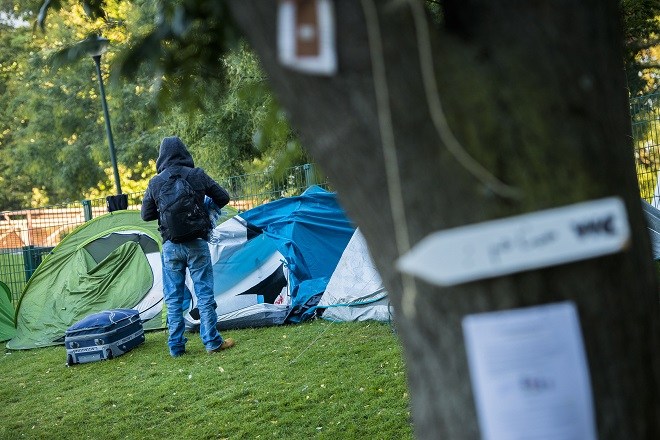At their request, the names of the asylum seekers and of the hosts have been changed to protect their identities.
Since he started staying with them, that Tuesday marked the first time that Yonas didn’t return home to sleep. While he had gone through more than one arrest before, dealing with the uncertainty surrounding his latest detention was a first for the Brussels family of four.
“Usually he gets home at dawn, before we wake up,” Sophie, a 36-year-old artist said, as she recalled the latest of what she calls Yonas’ “escapades”: his near-daily attempts at crossing the English Channel to make it to the United Kingdom, where he plans to apply for international protection.
After leaving his home in Eritrea four years ago, 30-year-old Yonas arrived in Brussels at the start of the year, and has been staying in the home of Sophie and Martin, a Franco-Belgian couple, and their two children, aged 4 and 6.
Twice per week, when dawn breaks, he returns to a room in their home to get some sleep, clean up and regain his strength. For the past seven months, he’s made it back to the house every time, meaning his attempts have been continuously unsuccessful.
Yonas is one of six people which the family have hosted in their home, located a short tram ride from downtown Brussels. While they all came from different backgrounds, the family’s guests all shared an unwavering determination to overcome a string of what Sophie described as “unimaginable” life circumstances in order to get a chance at a better future.
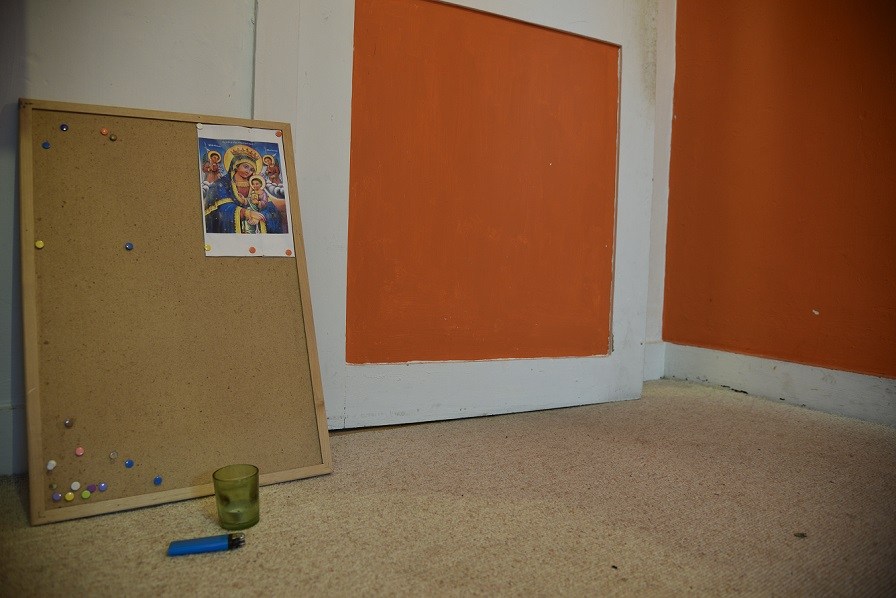
In his room, a corkboard and a photo of the Virgin Mary serve as a prayer altar for Yonas. Credit: Gabriela Galindo
As the visibility of undocumented migrants sleeping rough in the streets of Brussels grew, so did Sophie’s indignation. The situation reached a tipping point this spring, as hundreds of undocumented, homeless migrants were removed from the halls of Gare du Nord, where they had been sheltering for months from the inclement winter in Brussels.
“I started following the issue on social media, and every day I saw messages posted asking for volunteer workers or hosts,” Sophie said. “I just didn’t think it was humanely acceptable for these people to not be taken care of, I think it is scandalous — I couldn’t turn a blind eye to it, so we decided to act… to at least try to be a part of the solution.”
Like the hundreds of housing arrangements that are still taking place nightly in and around Brussels, it was through Facebook that Sophie got in touch with her family’s first guests.
“I really didn’t know what to expect,” she recalled. “But it all worked out much more smoothly than I imagined — they were really discreet, and I was surprised by how easy it all fell into place.”
“They stayed for three or four days, and I really saw that they were fully replenished: I heard them laugh, talk, joke around… but what struck me the most was how much they slept,” she said. “They had a completely destructured sleeping cycle… in the end, we saw less of them than we thought we would.”
Since they started hosting at the start of the summer, Yonas is the family’s most long-term guest. Week in and week out, moments with the family — like afternoon bike rides or a Saturday dance fair at the kids’ school — offer him some respite from the long hours spent waiting in bleak highway parking lots or on board a chilly freight truck’s compartment.
“It’s a good place, they’re a good family and the children are very funny,” Yonas said. “We speak in English, but mostly using signs,” he added.
Yonas, who declined to be interviewed further for fear of being recognised, said that he was tired, but that he would keep trying to make it to Britain “until he succeeded”.
A new home and set of circumstances
The family decided to start hosting after they moved into their new house, where “for the first time in their lives”, they had a little bit of extra room. “It’s quite austere, but it’s fairly large and is the calmest place in the house,” Sophie said of the room, which she said they would like to turn into the master bedroom at some point. Two individual mattresses and a couple of lamps make up the gross of the room’s furnishing.
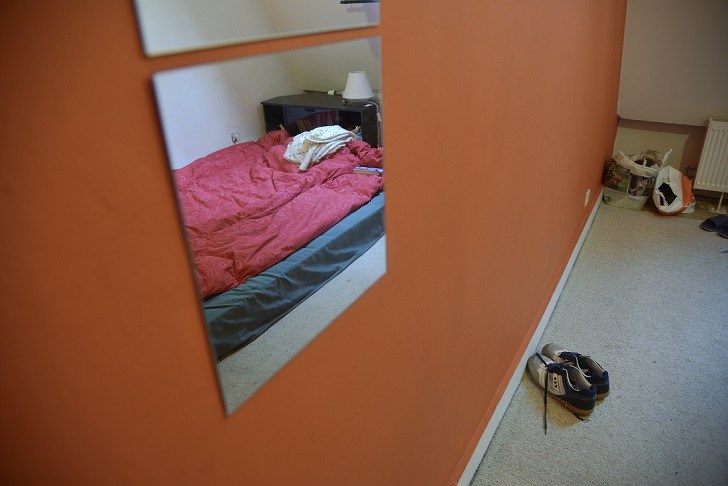
At dawn break, after spending hours the cold and in bleak highway parking lots, Yonas returns home to get some rest, before trying it all again the next day. Credit: Gabriela Galindo
Because of Sophie and Martin’s tight schedules — which sees them juggle their parenting responsibilities with their artistic and teaching careers — and with Yonas spending most of his waking time at night, there are weeks when they see little of each other.
“Sometimes we can run into each other in the early morning, but for the most part, our schedules don’t really coincide. We keep each other posted about our comings and goings, but he’s got his own keys, he comes and goes as he pleases.”
Despite their limited interactions, and even with a significant language barrier between them, Yonas and the family have clicked well together, with both parents affirming that the kids have grown attached to their house guest.
“I know through Martin that Yonas can spend hours playing with the children, there’s a sort of common humour between them; they play games or watch cartoons on the phone… They spend time together, that’s for sure,” Sophie said. “Sometimes — since he never knows whether he’ll be back the next day — he even gets up just to see them off to school.”
Over a meal, Sophie and Martin translate Yonas’ little spoken English to their kids — or not, because “sometimes there is no need.”
When Yonas called to tell her he had been arrested, Sophie’s first instinct was to reach out to Mathilde, a 28-year-old Brussels native who hosts Yonas on the days he’s not at Sophie’s.
Together with four flatmates, Mathilde has been hosting undocumented migrants in her apartment for over a year and decided to find a co-host for Yonas at the start of the summer.
“For us, it works out perfectly. Because of our jobs and the children, hosting someone every day would be difficult,” Sophie said. “And, I think it’s something both Yonas and Mathilde needed.”
“He has two kids, one of whom is the age of my son, so it is a great match. And I think it’s good for him to alternate between a family environment and that of a shared flat.”
Putting in place a shared hosting system is also a way for both households to absorb the costs of having a permanent guest at home. It makes it easier to navigate the legalities of uncertain or difficult situations, like detentions. But it also offers both of them a chance to cope with the emotional toll brought on by stepping into an unofficial humanitarian role at the same time as they navigate their own lives.
“I was worried — it was frustrating because I was not sure I had understood what had happened, or whether he was really in trouble. It’s not simple, once you get to know someone, once you’ve put a name to the face…” Sophie said, recalling the detention.
“When something like that happens, it’s good to not be doing this alone, to be able to talk and figure it out with somebody else,” she added.
A couple of days later, she received a text from Mathilde telling her that Yonas had come home safely.
Bridges over roadblocks
Navigating different careers, social circles and living in different parts of the city, Yonas is the only common denominator between Sophie and Mathilde’s lives.
At the base of the unlikely trio’s meeting lies the Citizen Platform for Refugee Aid and Support (Plateforme Citoyenne de Soutien aux Réfugiés), a grassroots movement of solidarity that has swept thousands in Brussels into voluntary humanitarian action.
Created in 2015 as a means to provide material relief to the migrants who started settling in Parc Maximilien, located a stone’s throw away from the Federal Immigration Office (at a time when it was overwhelmed by arrivals), the movement’s ranks grew rapidly, its members becoming increasingly organised.
Over the years, individual acts of solidarity in the form of material support — food drives, camping tents, warm clothes — gave way to a fully-fledged humanitarian network, which today continues to reach out to those left on the sidelines of official immigration and asylum schemes, thereby making up for a lack of comprehensive immigration policy from federal authorities.
“The platform was born out of the inappropriate management — the lack of management — of migratory flows coming in and through Belgium,” Mehdi Kassou, co-founder of the platform said.
“There is a clear correlation between the government’s standing and the creation of makeshift camps, which ultimately pushes the associative and civil spheres to address the problem themselves,” he said, adding that Belgium refused to be the only country in the EU to make changes in its immigration system, fearing a pull effect which non-profits in the sector dispute, citing the overall stable number of undocumented migrants in Brussels over the past two years.
It was the citizen response to the informal settlements in public areas around Brussels which eventually led to the platform becoming an official non-profit in 2016.
“The platform’s focus shifted increasingly to setting up nightly hosting arrangements from 2017, when authorities launched recurrent arrest operations targeting the migrants sleeping in the park,” Kassou said.
Documents reviewed by news agency Belga revealed that the federal migration and interior ministeries, led by Theo Francken and Jan Jambon at the time, gave the green light to police sweeps of the park in which daily arrest quotas were required from officers.
Throughout that year, the continued presence of migrants in the park sparked opposing responses from the civilian and political spheres, with citizens seeking to shelter migrants from the increasingly repressive response from authorities. Tensions over migration —including serious accusations that Francken facilitated repatriations of Sudanese nationals, who were reportedly tortured upon their return — ultimately contributing to both ministers’ resignation from the federal government.
A determined group action
Despite the shake-up, the government’s response to the situation has hardly budged, with Kassou saying that the engagement of citizens like Sophie and Mathilde has and continues to be of vital importance, nearly five years on.
Today, the platform’s Facebook group totals more than 40,000 members. Dozens of messages posted daily show how an increasing number of concerned locals continue to use their spare time and pool together their personal resources to respond to the needs of the migrants which Kassou say have “no administrative existence” and thus no rights, in the eyes of the state.
While some of these actions continue to be sporadic or one-off arrangements, others have turned into more permanent arrangements.
“He’s like another flatmate,” Mathilde said of Yonas, an assessment to which her housemate Jeanne, 29, agreed.
More than a dozen different people have been hosted in the central, five-bedroom Brussels apartment Jeanne and Mathilde share with two other workers, all in their late twenties or early thirties.
While Mathilde was no stranger to the platform’s actions, which she had been following on social media for some time, she said it was the fact of committing to the cause as a group that really set things in motion.
“Our first guests were three friends who stayed for around two or three days,” Mathilde said, explaining that volunteers with the platform organised the nightly stays out of Parc Maximilien, where groups of homeless migrants can still be seen camping.
For a period of around six months, the four housemates fell into a rhythm of clocking off from work and their daily activities and heading to the park to pick up their guests for the night. In the morning, as they headed to work, they would take turns to bring them back to the park, where another host would collect them that evening.
At the start of the year, they met Yonas and Henok — a fellow Eritrean with whom Yonas crossed paths at some point during a years-long journey which saw him cross several borders by foot and risk the deadly Mediterranean crossing.
Henok made it to the U.K. in June and is now waiting to hear back on his asylum application. Since then, it’s only been Yonas at the four flatmates’ home.
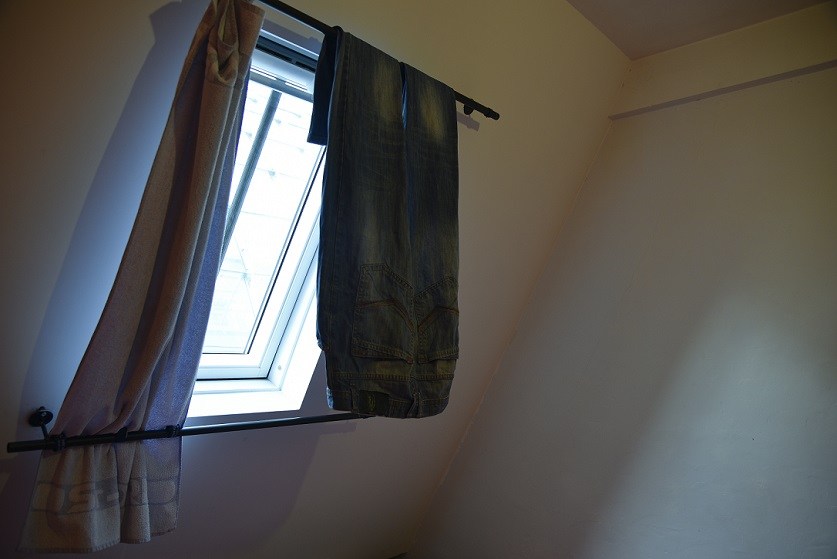
"Being without a home, it’s not an easy thing… I wanted to change my life, so I put myself in this situation," said Henok, who was hosted in a shared flat in Brussels for months while he attempted to cross to the UK. Credit: Gabriela Galindo
“He lives at night, sometimes we cook or eat dinner together, and then he has his meeting to attempt the crossing every night at 10 pm,” Mathilde said. “So, generally, the moment when he’s getting ready to start his day is the moment when we come home exhausted from ours.”
But, sometimes, their schedules match, be it for a short meal, a discussion over tea, or larger social gatherings, which open the door to unique exchanges and rich discussions, Mathilde said, recalling a gathering Yonas and Henok organised to celebrate an Eritrean holiday.
“It was so lively, Yonas and Henok cooked for us and took care of everything and it was such a great mix of people because we also had friends from abroad visiting,” she said. “At one moment, I found myself in the middle of two conversations: on one side, I heard Henok telling his story, and describing how he had travelled across Italy to arrive here, while, at the same time, my friends were going over their upcoming holidays in Italy… It was like standing at a bridge between two parallel lives.”
But sharing their home and their everyday lives with someone in need has added costs, the least of which appears to be monetary. Both Jeanne and Mathilde admit that the feeling of not being around Yonas enough takes the hardest toll on them, and is one of the reasons which make them glad to have found a co-hosting arrangement with Sophie.
Born in France from Congolese parents, Jeanne works as a nurse in the emergency room of a public hospital in Brussels, where she has been living for over a decade.
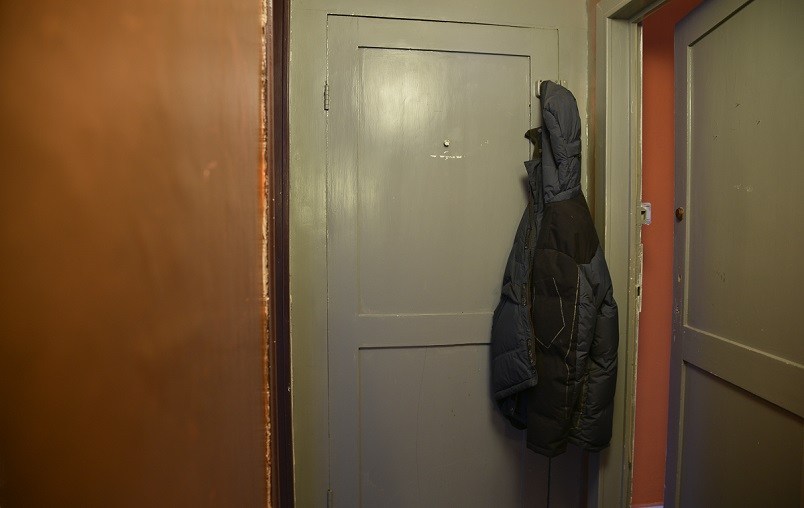
A hand-me-down winter coat, shared between the over a dozen undocumented migrants which have been hosted by Mathilde and Jeanne in their shared Brussels apartment. Credit: Gabriela Galindo
“It can often recall character flaws and emotional shortcomings of which I am not proud. Sometimes it can be too much to come home to, and it can even remind me of my own family’s migratory history,” she said, dismissing Mathilde’s reminder that her job is already physically and emotionally demanding as a “good excuse.”
Both flatmates’ feelings are mirrored by many on the platform’s Facebook group, in which users turn to fellow volunteers to vent feelings of frustration, anger and helplessness that emerge when individual citizens are left to navigate a policy void and grapple with the government’s choice to turn a blind eye to blatantly visible humanitarian needs.
“When you host, you really come face to face with the problem, you realise how big it is and how far you are from solving it by hosting someone from time to time,” Mathilde said.
But, according to representatives of the associative sector, the response of citizens like Mathilde, Jeanne, Sophie and Martin has been a vital and key driving-force for change in Brussels.
Some government support
David Leclercq, who coordinates activities at a reception centre for undocumented migrants called the Humanitarian HUB, said citizen volunteers are “essential” in the accomplishment of their activities, centered around providing information, social, psychological and medical services, collecting donations and connecting migrants with families or loved ones with whom they lost contact along the way.
Sustained citizen support of undocumented migrants and engagement with non-profits piling the pressure on politicians eventually saw the City of Brussels provide the Citizen Platform with a building in which to set up a housing centre, known as Porte d’Ulysse, which today houses up to 350 people.
Additionally, as many as 250 people are still hosted each night by citizens, mostly living in Brussels (40%) and Flanders (17%), with the remainder spread out throughout other parts of Belgium, according to figures collected by the Citizen Platform.
In the face of continued disengagement by federal authorities, in 2018, the Brussels-Capital Region granted both the housing centre and the platform with provisional funds, renewed periodically, which Kassou said kept things “precariously going”, and still dependent on citizen engagement.
“Be them medical professionals or 16-year-old students, the hub would simply not be able to function without citizen volunteers,” Leclercq said. “And I also find the citizen response extraordinary: these people do not worry that helping one person will mean more may come knocking at their door — they simply see someone who is cold, hungry, tired and offer them a helping hand, and I think it sends quite a powerful message in terms of recognising another person’s humanity.”
And, for some people, one citizen’s helping hand can make a world of a difference.
From the bottom up
Young people in Eritrea are forced into indefinite military conscription in order to uphold the security ambitions of a militarized and authoritarian political regime, in place since 1993, which has consistently landed at the bottom of human rights, press freedoms and civil liberties rankings — and which thousands risk their lives to escape.
“The government forces you to be a soldier,” Henok said in a Skype interview. “I have two brothers, who have been serving in the army for over 20 years, they cannot live their lives.”
After being sent to a military training academy, called the SAWA Defence Training Centre, Henok obtained a passing mark in an examination which allowed him to start his studies in clinical laboratory sciences, which he was later forced to give up due to family problems.
A series of events, including a three-month detention after he crossed one of the country’s “checkpoints” — a mechanism to prevent military defection or evasion — to go visit a sibling, resulted in him being forced into the army.
“Then, life was not good for me… I tried getting back to my studies, but I was discouraged and I eventually decided to leave my country,” he said.
A brief period in Ethiopia was followed with a stay of nearly two years in Khartoum, Sudan, where he said police repression towards migrants and fears of being sent back to Eritrea eventually pushed him to head to Europe.
After arriving in Italy, he headed north. “On my first night in Brussels, I slept in Gare du Nord,” he said. “Then, I met Mathilde.”
Referring to himself as “illegal,” he said his experience in Belgium was a unique episode of a journey which saw him live in and cross through several European and African countries.
“Being illegal, anywhere, is not good, you don’t have any self-confidence, you are always stressed… But this stress was reduced by my hosts, who helped me beyond my greatest expectations. My life is full of joy now, and it is because of Mathilde, Jeanne and [the others],” he said.
“Being without a home, it’s not an easy thing… I wanted to change my life, so I put myself in that situation — I saw and lived through horrible things and, when I arrived in Brussels, I saw myself as a human being again.”
“I never imagined I would receive help from ordinary people. My hopes and expectations were for the government to give me a status. But I was very grateful for everything when I was with them, I had a happy life with them, they supported me as only a family can. I will always remember them. They helped me through it, they helped me survive.”
He stayed with the housemates for six months, eventually introducing them to Yonas, who is still trying to make the dangerous crossing. Henok is now being housed in a shared apartment provided by the U.K. Home Office, and his asylum application is currently being processed.
Given the chance, he said he would not hesitate to return to the studies he was forced to leave behind ten years, several countries and an entire life ago.
| Behind the numbers Lack of information about the rights and services given to migrants and asylum seekers in Belgium, compounded by word-of-mouth reports of rejected applications, police repression, or fears that they may be expelled from Belgium lead many of them to set their eyes on the UK instead. Fedasil, the federal agency responsible for processing asylum requests, provides housing only for people who have lodged an asylum request, at a cost which generally amounts to around €40 per person, per day, spokesman Benoit Mansy said in an email statement. Many undocumented migrants in Brussels are not immediately eligible for international protection or asylum schemes in Belgium because they were registered as entering the EU through another country — often border ones such as Italy, Greece or Spain — which the EU’s Dublin Regulation designates as the countries responsible for receiving their claims to asylum. In figures Undocumented migrants in Brussels are mostly assisted by the Humanitarian HUB, a conglomeration of non-profits (including Doctors Without Borders, the Red Cross and the Citizen Platform) which joined forces and resources in 2017. According to figures released by the hub in June, a relatively stable turnover means the estimated presence of undocumented migrants in Brussels is currently of between 800 to 1,100. From January 2018 to June 2019, 68,000 people were admitted into its services, with 230 daily admissions done during the first six months of operations. The gross of the hub’s funds is made up of the individual resources of the non-profits that compose it and of a monthly budget provided by the Brussels-Capital Region, on which it is awaiting official confirmation. |
By Gabriela Galindo

